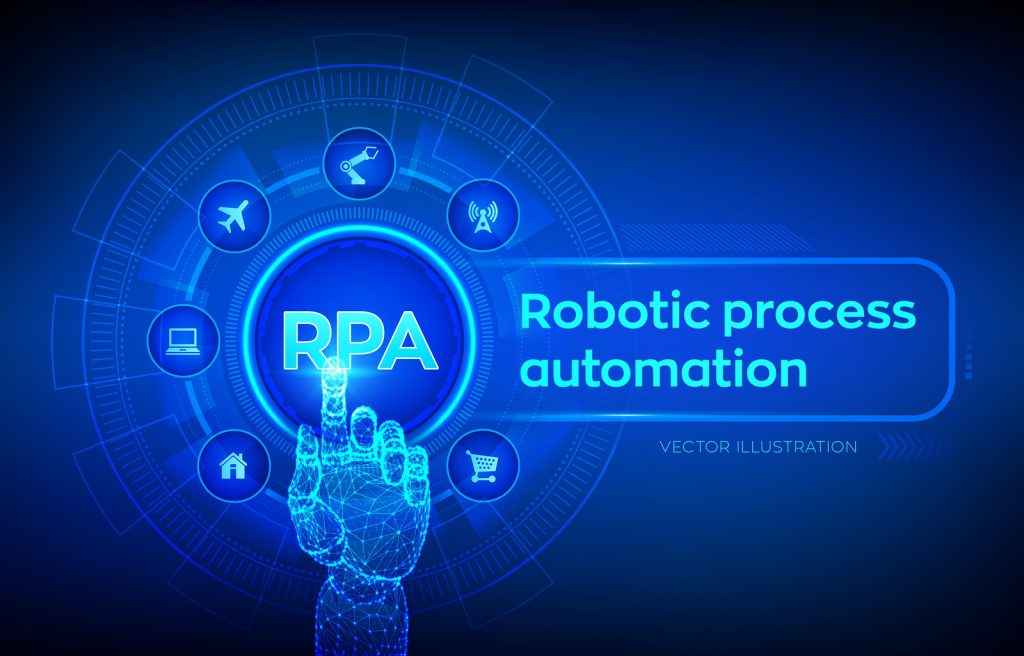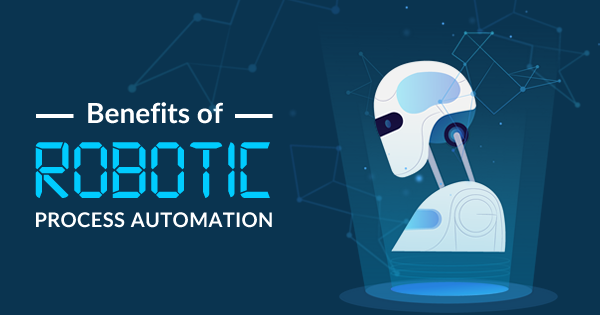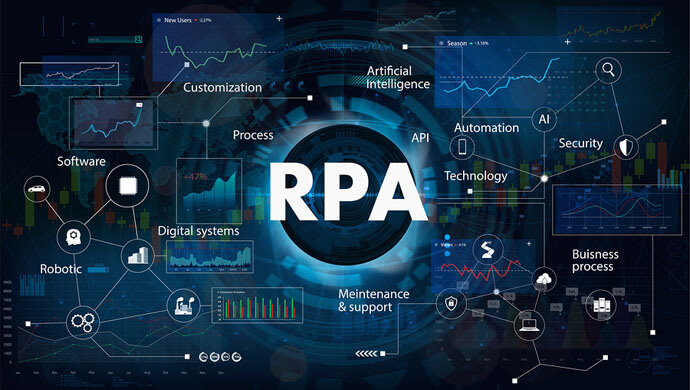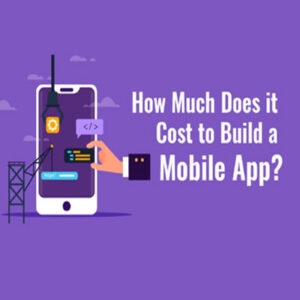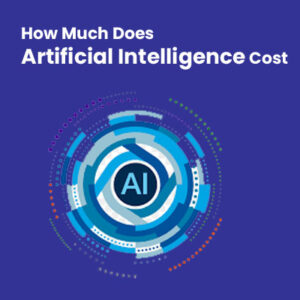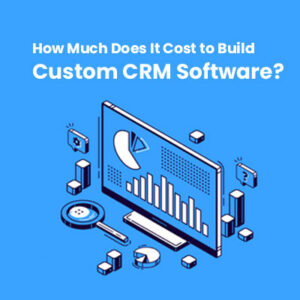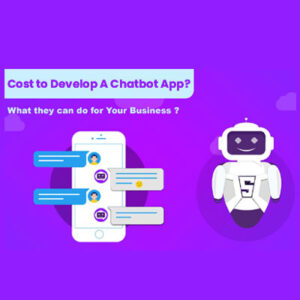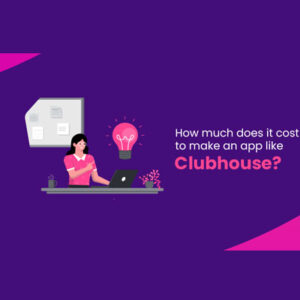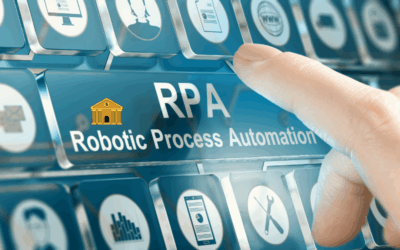Intellectual Robotic Process Automation- Benefits & Use Cases
Intellectual Robotic Process Automation – Benefits & Use Cases
The Role Of Robotic Process Automation In This Modern Era
Automated machines are taking over human power in the workplace with no scope for inefficiency. Mobile technology trends have changed the way of the work process in every industry. We can observe machines are capable of achieving more tasks than humans using the power of automation technologies. In some cases, they can complete human work more accurately with timely results.
Many companies are moving towards the digital workplace to ensure error-free productivity. Businesses are using artificial intelligence robots to perform everyday operations more efficiently than humans.
AI-powered solutions in banking and FinTech are beneficial for performing activities like automatic transaction processing, fraud prevention, loan lending, credit eligibility checking, insurance claiming, data manipulation, and virtual in-app customer support. Hence, banks can perform all internal processes with less involvement of human resources and save costs.
Accordingly, AI technology is also widely adopting by the retail, manufacturing, and healthcare sectors, etc., for streamlining their operations and witnessing profitable business scape.
The advancements in artificial intelligence and machine learning techniques are further taking the automation-level to the new heights. RPA is one of the technologies which is playing a vital role in optimizing automation levels. In this article, we would like to discuss a few Use Cases of RPA in Retail, RPA in FinTech, and RPA benefits in banking industry.
Here we go!
What Is Robotic Process Automation?
RPA technology helps software developers to build, deploy, and manage software that mimics human tasks with 100% accuracy. Many organizations across production and service sectors are using RPA to streamline internal operations at a low cost. With a focus to automate regular tasks, firms are adopting robotic solutions to increase productivity and optimize automation across high-level operations.
RPA solutions are categorized into two types, including rule-based and repetitive types. For instance, RPA-powered software solutions can perform filing e-forms, data entries, read e-mails, track inventories, warehouse management, and etc., without any assistance from humans.
Further, RPA is also being applied to develop digital attended robots to perform front desk operations. Such front-desk robots can handle calls, take notes & reminders, and assist agents during customer interactions.
Let’s look at a brief on cognitive RPA.
What is Cognitive Robotic Process Automation?
Cognitive robotic process automation uses artificial intelligence to complete the work processes smartly. Using Natural Language Processing (NLP), machine learning, text analysis, and character recognition, Cognitive RPA solutions will grab self-learning capabilities from the available data.
Such a continuous learning process will help systems or applications handle complex tasks seamlessly. Hence, by using the cognitive robotic automation process, companies can improve the overall business quality, reduce errors, and improve scalability.
Extension of RPA’s Reach With Cognitive Technologies
The software robots can perform rule-based actions that are predefined and trained to do. It means these bots cannot perform actions that require human perception decisions.
The RPA is helpful in places to perform repetitive and easy tasks like data entries, service support, and predictive maintenance. It requires human support to handle complicated exceptions.
The emerging technologies are bringing humans and computers to the same phase for effective automatic processes. RPA can be represented as three levels according to their intelligence.
- Rule-Based Automation
The robots that complete the work process depending upon the predefined rules fall under this category.
- Intelligent Process Automation
These computer robots can analyze the unstructured data available in the system to draw interfaces and communicate with humans.
- Cognitive Platforms
The cognitive robotic process automation can learn from previous experiences and perform complex tasks with minimum human interaction. Hence, the integration of cognitive technology in RPA will help solutions to think like humans and improves workflow efficiencies.
Benefits Of Cognitive Robotic Process Automation
As businesses want to implement automation in their operations, the scope for AI and RPA technologies-powered applications is high. Here are the advantages of using cognitive RPA.
- Increases business agility by handling highly complex processes and unstructured data.
- Improves product quality by reducing human errors and giving smart insights.
- Improve data security with effective monitoring and fraud detection.
- The automation of regular operations in businesses will reduce costs.
- Makes consumer-centric decisions by analyzing the data sources, which results in customer satisfaction.
- Employees can engage and focus on qualitative tasks, which are beneficial for the organization and personal career growth.
What are the Applications Of Cognitive RPA?
The cognitive RPA can be used in many cases to make a significant difference in the work processes. Here are top robotic process automation use cases across industries.
- RPA Benefits In Customer Service
Virtual customer support is one of the top RPA use cases in banking, retail, and many more sectors. Smart AI chatbots to provide instant customer service support round the clock. The integration of robotic process automation in banking apps or retail apps will give customers the experience of talking with human representatives.
- Finance & Accounting In Banking
The benefits of robotic process automation in banking are incredible and accounting is one of them. Accounting departments can use cognitive RPA to automate the invoicing process with zero errors.
Smart RPA applications in banking will perform tasks like opening e-mails, extracting payment details, and copy them to accounting and audit systems. By integrating the cognitive software bots into the system, the team can spend more time on other related areas to improve company profits.
- Product Categorization in Retail
Product categorization is one of the top RPA Use Cases in Retail Industry. Collection and analyzing data from stores located in different locations is a big challenge for the retail industry. But, this becomes simple with cognitive RPA. The cognitive robots can analyze data in multiple formats like texts, and images to create structured data and labeled logs without any errors.
- Automating Sales Operations
Robotic process automation use cases for automating the tasks of a sales representative are also one of the top applications of the technology. Cognitive RPA can better handle the agents in real time and improve conversions.
RPA in retail will automate sales operations. Starting from gathering customer requirements, taking order details, and tracking order status smartly. Hence, RPA benefits retailers in streamlining their sales operations.
Get In Touch To Know More about RPA Use Cases in Retail Industry
- RPA In Fintech For Documents Processing
The cognitive RPA uses optical character recognition technology to process documents of all formats without any error. It can tackle unstructured data efficiently, which is an irritating and error-prone operation of the business. This is helpful in the healthcare, banking, FinTech, and insurance industries in processing loan applications or insurance claims faster.
- Hassle-free Insurance Claiming
Data gathering, validation, and claim updates are the main operations of insurance agents. RPA applications in FinTech can perform all these tasks more efficiently than humans. RPA apps will retrieve data from different sources, such as renewals, claims, or monthly reports, and accomplish the tasks as they are trained.
- Automates Employee Onboarding
Robotic Process Automation benefits HR in many ways and smooth employee onboarding is one of the applications of RPA for HR. The employee onboarding process is a multistep task for the HR department that requires time and effort. Cognitive robotic process automation can streamline this process in an efficient and error-free manner. It can handle the automatic creation of login credentials, schedule meetings, team introduction emails, and more.
- Better Software Testing
The continuous changes in application features will reduce the efficiency of conventional testing techniques. In this case, the manual power involvement is worthless and reduces the quality assurance of the product. But the cognitive RPA can design a dynamic testing process that self-improves according to the development process. So, optimization of test techniques is not necessary throughout the app life cycle.
- Self-Maintenance
The identification of product defects during the development process is a difficult and time-consuming process for production resources. A lot of effort of resources are needed to fix them. Cognitive RPA solutions can monitor production quality and reduce the rate of defective products. Hence, the implementation of RPA solutions can assure application quality with less effort.
Apart from these, we can use cognitive RPA in different categories of the industry to improve productivity and customer experience. In present days, this technology can achieve image identification, categorization, extracting data, and more. With innovations every day, we can expect more advancements for a better tomorrow.
Conclusion
Automation is the driving force behind introducing digital workplaces in businesses. The RPA bots, using the combination of emerging technologies, will perform repetitive tasks smartly without the intervention of humans.
USM is the best software development company in the USA and India. We have vast proven experience in RPA app development for businesses across various industries.
